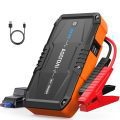If you’re like many vehicle owners, the thought of diagnosing car troubles can feel overwhelming. With the complexity of modern vehicles, understanding what’s happening under the hood often requires specialized knowledge. That’s where Bluetooth OBD scanners come in. These handy devices simplify the process of accessing your car’s On-Board Diagnostics (OBD) system, allowing you to monitor performance, troubleshoot issues, and make informed decisions about repairs. In this blog post, we’ll delve into the world of Bluetooth OBD scanners—what they are, how they function, and the advantages they offer. We’ll also share tips on selecting the right scanner to meet your needs, empowering you to take control of your vehicle’s health.



What is an OBD Scanner?
An OBD (On-Board Diagnostics) scanner is a crucial tool for diagnosing and monitoring the performance of modern vehicles. With the advancement of automotive technology, vehicles are equipped with sophisticated computer systems that continuously monitor various components and systems. An OBD scanner interfaces with these computer systems to retrieve critical data, including diagnostic trouble codes (DTCs) and real-time performance metrics. This information is vital for effective vehicle maintenance and troubleshooting.
Function of OBD Scanners
OBD scanners serve multiple purposes, including:
- Diagnosing Issues: By reading DTCs, mechanics and car owners can identify specific problems within the vehicle’s systems. For instance, a code like P0420 indicates a potential issue with the catalytic converter.
- Monitoring Performance: Beyond simply diagnosing issues, OBD scanners can provide insights into real-time performance data, such as engine temperature, vehicle speed, and fuel efficiency.
- Emissions Testing: Many regions require vehicles to pass emissions tests. OBD scanners can help ensure that your vehicle is compliant with environmental regulations by checking for any emissions-related faults.
Types of OBD Scanners
OBD scanners come in various forms, and they can be broadly categorized into two main types: wired and wireless. Each type has its unique advantages and is suited for different user preferences.
Wired OBD Scanners
Wired OBD scanners connect directly to the vehicle’s OBD-II port, usually located under the dashboard near the steering column. This direct connection allows for quick and reliable data retrieval.
Popular Wired OBD Scanners:
- BlueDriver LSB2: This scanner not only reads DTCs but also provides repair suggestions. It’s user-friendly with a clear interface and is suitable for both professionals and DIY enthusiasts.
- Autel MaxiCOM MK808: A professional-grade tool that offers comprehensive diagnostics for various vehicle makes and models, making it ideal for mechanics.
Wireless OBD Scanners
Wireless OBD scanners utilize Bluetooth or Wi-Fi to connect to a smartphone, tablet, or computer, offering the flexibility to access data without being tethered to the vehicle.
Popular Wireless OBD Scanners:
- FIXD OBD2 Scanner: This device connects to your smartphone and offers a simplified interface for everyday users, helping them understand their vehicle’s health without extensive automotive knowledge.
- OBDLink LX: A more advanced option, the OBDLink LX offers extensive functionality, including real-time data logging and compatibility with various third-party apps.
How OBD Scanners Interface with Vehicle Systems
The OBD scanner communicates with the vehicle’s Engine Control Unit (ECU), which is the brain of the vehicle’s operations. When you plug in an OBD scanner, it performs a series of steps:
- Connecting to the OBD-II Port: By plugging the scanner into the OBD-II port, typically located under the dashboard, the device establishes a connection.
- Retrieving Data: The scanner sends a request to the ECU to access stored diagnostic trouble codes (DTCs) and monitor real-time data.
- Displaying Information: The scanned data is then displayed on the scanner’s screen or paired device, allowing for easy interpretation.
Key Benefits of Using an OBD Scanner
Using an OBD scanner can offer several advantages to vehicle owners and professionals:
- Cost-Effective Maintenance: Identifying issues early with an OBD scanner can help prevent costly repairs down the line.
- User-Friendly: Many scanners come with clear instructions and mobile app support, making it accessible for all users.
- Enhanced Vehicle Knowledge: Understanding the data retrieved from the scanner can empower vehicle owners to be more informed about their vehicle’s health.
Comparison Table of Popular OBD Scanners
| Feature | BlueDriver LSB2 | FIXD OBD2 Scanner | Autel MaxiCOM MK808 | OBDLink LX |
|---|---|---|---|---|
| Connection Type | Wired | Wireless (Bluetooth) | Wired | Wireless (Bluetooth) |
| Compatibility | Universal | Universal | Extensive (multiple brands) | Universal |
| User Level | Beginner to Advanced | Beginner | Professional | Intermediate to Advanced |
| Real-Time Data | Yes | Yes | Yes | Yes |
| Repair Suggestions | Yes | No | Yes | No |
| Price Range | $100 – $150 | $50 – $70 | $300 – $400 | $40 – $60 |
By utilizing an OBD scanner, vehicle owners can proactively manage their vehicle’s health, ensuring a safer and more efficient driving experience. Whether you’re a professional mechanic or a casual car enthusiast, investing in an OBD scanner can be a valuable addition to your automotive toolkit.



Understanding Bluetooth Technology in OBD Scanners
Bluetooth technology has revolutionized the way we connect devices, and OBD (On-Board Diagnostics) scanners are no exception. By leveraging Bluetooth connectivity, these scanners provide users with enhanced functionality, ease of use, and the ability to access real-time vehicle data through mobile applications. In this section, we’ll explore the advantages of Bluetooth-enabled OBD scanners and how they communicate with smartphones and tablets.
Advantages of Bluetooth Connectivity
Bluetooth connectivity in OBD scanners offers several benefits that enhance the user experience. Here are some key advantages:
- Ease of Use: Bluetooth scanners are designed to be user-friendly. Users can easily pair their smartphones or tablets with the OBD scanner without the need for cumbersome wires. For example, the BlueDriver Bluetooth Professional OBDII Scan Tool connects seamlessly to your mobile device, allowing you to start diagnosing your vehicle almost immediately.
- Mobility: The wireless nature of Bluetooth allows for greater mobility. Users can move around the vehicle while monitoring diagnostic data. This is particularly useful for technicians or DIY enthusiasts who need to inspect multiple areas of the car without being tethered to a device.
- Real-time Data Monitoring: Bluetooth OBD scanners can connect to mobile applications that provide real-time data monitoring. Applications like Torque Pro or Car Scanner offer a comprehensive view of your vehicle’s performance metrics, allowing users to diagnose issues on the fly. This immediate feedback can save time and money by facilitating quicker repairs.
- Convenient Data Analysis: Many Bluetooth OBD scanners come with companion apps that allow users to not only view diagnostic trouble codes (DTCs) but also analyze performance data and even reset engine lights. For example, the FIXD OBD2 Scanner app provides insights into your vehicle’s health and alerts you to potential issues before they become costly repairs.
Communication Between Bluetooth OBD Scanners and Mobile Devices
Bluetooth OBD scanners communicate with smartphones and tablets through a simple pairing process. Here’s how it typically works:
- Connection: The user plugs the OBD2 scanner into the vehicle’s OBD2 port, usually located under the dashboard.
- Pairing: Using Bluetooth settings on their mobile device, the user searches for available devices and selects the OBD scanner to pair.
- App Launch: Once paired, the user opens the corresponding app to initiate communication. The app will often guide the user through any setup necessary to start monitoring data.
Practical Examples of Bluetooth OBD Scanners
To illustrate the advantages of Bluetooth technology in OBD scanners, here are some specific product examples:
| Product Name | Key Features | Mobile Compatibility | Price Range |
|---|---|---|---|
| BlueDriver Bluetooth Professional OBDII Scan Tool | – Comprehensive diagnostics, – Live data streaming, – Repair reports | iOS, Android | $99.95 |
| FIXD OBD2 Scanner | – Real-time health monitoring, – Multi-vehicle compatibility, – Engine light reset | iOS, Android | $59.99 |
| Ancel BD310 Bluetooth OBDII Scanner | – User-friendly interface, – Fault code reading and clearing, – Free app for Android | Android | $29.99 |
| BAFX Products Bluetooth Diagnostic OBDII Reader | – Compatible with iOS and Android, – Reads and clears codes, – Works with Torque Pro app | iOS, Android | $24.99 |


Summarizing Key Insights and Benefits
In conclusion, Bluetooth OBD scanners serve as essential devices for effectively monitoring and diagnosing vehicle health. With a clear understanding of how they operate, their advantages, and important factors to consider when choosing one, users are better equipped to enhance their vehicle maintenance routine. Before purchasing, it is advisable to assess your individual requirements and ensure compatibility with your vehicle for the best results.






Just a tip: if you’re getting a Bluetooth OBD scanner, look for one that has a smartphone app. It makes reading the codes so much easier!
Absolutely! Having a companion app can make a huge difference in usability. Thanks for sharing your tip!
I’m curious about DIY repairs. If I get a Bluetooth OBD scanner, will it really help me fix issues on my own, or is it more for diagnostics?
It can definitely help with DIY repairs! Understanding the codes can guide you on what to check or fix yourself. Just be cautious with repairs you aren’t sure about!
I’ve heard some people say that OBD scanners can be a waste of money if you don’t know how to interpret the data. What do you think? Are they really worth it for the average car owner?
I’d like to know more about how Bluetooth technology actually works in these OBD scanners. Can you break it down a bit?
Great suggestion! I can definitely expand on the technical aspects of Bluetooth in OBD scanners in a future article. Thanks for the feedback!
I recently got the FIXD OBD2 Scanner, and it’s been a game-changer for me. It explains engine codes in plain English. Anyone else tried it?
What about compatibility with different car brands? Do all Bluetooth OBD scanners work with every make and model?
That’s a common concern! While most Bluetooth OBD scanners work with a wide range of vehicles, it’s always a good idea to check compatibility before purchasing. I’ll make a note to cover this in more detail soon!
Can anyone recommend a specific Bluetooth OBD scanner? I’m looking for something affordable but reliable!
I personally love the BlueDriver Bluetooth Pro OBDII Scanner! It’s super user-friendly and gives you detailed reports. Plus, it has great reviews!